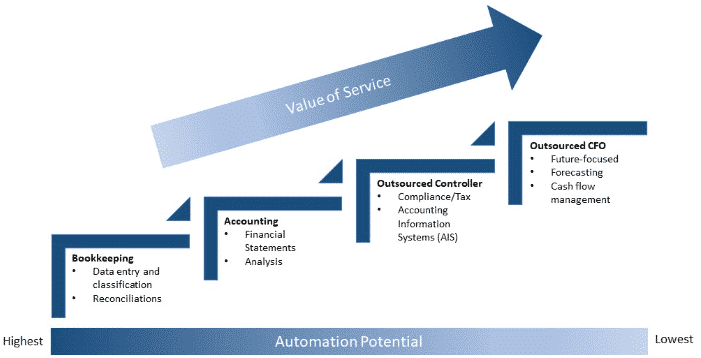Yes, I understand “dumpster fire” is an overused term in pop culture. Honestly, the title allows me to use my favorite gif of all time, so I’m going with it. In this post, I am going to discuss some of the top accounting issues for creative and advertising agencies. This post was preempted by a question I received on our Facebook page, and will serve as a deeper dive.
I know you have a lot of skill in handling accounting for (creative & advertising) agencies, so how would your outsourced accounting services differ for (creative & advertising) agencies?
~ Chris Johnson, agency growth coach extraordinaire, Upscale Method
Where does accounting end and finance begin?
Below is an image from the Outsourced Accounting page of our website, and it’s worth posting here. Accounting and finance are very different things. Accounting is focused on the production of reports and financial information – it’s very much a scorekeeping function. Finance is focused on the future – planning, forecasting and strategy. In the context of the below image, accounting ends after the “Outsourced Controller” step. Accounting is meant to provide adequate, accurate and timely financial information to allow for strategic decision-making.

In many respects, creative and advertising agencies operate like other service-based business. However, there are a few common issues I work on with all my clients. Here are the top accounting issues for creative and advertising agencies…
Top 3 accounting issues for creative and advertising agencies
1. Software
It’s 2019 and your agency should be using a cloud-based accounting infrastructure. This includes:
A general ledger system
“General ledger” basically means a database where all of your accounting transactions are stored and categorized. If you’re a freelancer, this is likely something like Wave or Freshbooks. If you’ve reached the agency stage, you should be using something more advanced like QuickBooks Online, Xero or NetSuite. The general ledger is the backbone of your accounting and finance infrastructure, so you want to make sure it’s easy to use, provides the information you need to run your agency, and connects to as many of your other software packages as possible.
An invoicing system
This is likely the same system as your general ledger, but maybe not. Depending on the complexity of your contracts with clients or other needs, you may use a platform like Bill.com or Contractbook. The bottom line here is you want a system that makes it easy to: send invoices, collect payment, follow up on overdue invoices and add late penalties, if needed.
A system to pay bills
Again, you want this to be as easy as possible. You’ll need to pay contractors, freelancers, vendors and maybe even influencers in your day-to-day operations. You don’t want to have to hand write checks and do manual data entry to your general ledger. You’ll also want to be able to automatically track who should get a 1099 at the end of the year to make tax time easier. Bill.com is a good option here as well.
Payroll system
Your people need to get paid the correct amount, on time, every time. All of the agencies I work with are S-Corps, so they have to deal with reasonable compensation for the owners as well. A solid payroll system that integrates with your general ledger makes everything easier.
Time tracking system
We use Harvest in our firm, but I also really like TSheets. Accurate time tracking helps with payroll, potentially. However, it also has other uses in invoicing, utilization analysis and maybe even tax deductions.
How is an agency’s need for a cloud-based infrastructure different from other businesses?
For the most part, this is standard procedure now. But, there are a few differences. For one, cloud-based applications are more commonplace in the agency space, and thus there’s a higher need for data connectivity. Problems occur when the data you’re generating and storing is in silos and/or proper analysis is a manual effort. Second, I have a construction client who, for various reasons, has to use paper, handwritten timesheets. That sort of situation should never exist in agencies.
For more information on Cloud Accounting and why it’s important, check out the below video.
2. Should your agency use cash or accrual accounting?
What is cash accounting?
Cash accounting is exactly what it sounds like – accounting transactions are recorded when cash moves. You received funds in your bank account from a client? Book it as revenue. You paid your employees and the funds were drafted from your bank account? Book it as expense.
What is accrual accounting?
Accrual accounting is when you book the accounting entries as the activity occurs. In other words, you’re matching revenue and expenses with the period of time when they occurred. For example, you sign a contract on January 1st, do the work all month, and then the customer pays you on February 1st. When do you book the revenue? Throughout January, because that’s when the activity took place to earn the revenue. Expenses work the same way.
So, should your agency use cash or accrual accounting?
The vast majority of businesses are small businesses, and I’d say the vast majority of small businesses use cash accounting. Agencies, except for the smallest of agencies or freelancers, should use accrual accounting. In order to effectively run your agency, you need to have accurate and timely information. That’s what accrual accounting provides. When you look at your P&L for the month, you’ll know exactly how you performed, and there won’t (or shouldn’t) be transactions that are unaccounted for.
Of course, the drawbacks of accrual accounting are that it requires good systems (see above), generally requires somebody trained in accounting to implement and manage, and makes accounting automation difficult.
For more information on accrual accounting for agencies, see the below video.
3. The chart of accounts
The chart of accounts is a listing of all the financial accounts, or buckets, contained within the general ledger. The structure of the chart of accounts determines how much detail your financial statements have as well as where things are located geographically on those statements. Too many accounts and classifying your transactions becomes abnormally difficult. On the other hand, too few accounts and you won’t have the proper information to make informed decisions.
For agencies, structuring the chart of accounts so they have an accurate margin is a big deal. For instance, there is often a lot of confusion around hiring contractors and freelancers. Any expense that is 100% variable with generating related revenue should go “above the line”. For instance, hiring contractors for a specific job should be in a “Contract Labor” account above the line. Expenses associated with “permalancers”, however, should go below the line. Permalancers you would pay anyway. Contractors that you hire for a specific job are only being paid by you for that specific job. Hence, they represent a 100% variable expense. In a perfect world, and if you had the resources to make it happen, below the line people expense would be allocated above the line to specific clients and projects for management reporting, where applicable.

Putting a bow on it
For the most part, accounting for creative and advertising agencies mirrors that of other service-based businesses. Particularly accounting. However, there are several nuances that you need to be aware of as an agency owner. Additionally, I’ve found the issues above to be a little more important for agencies to get right than for other types of businesses.
Accounting is a scorekeeping function. However, it is the backbone of all the financial decision-making that will occur within your agency. Without solid accounting, anything that’s future-focused becomes very difficult. Cash flow management, financial forecasting and budgeting are all very difficult without a proper accounting function.
This post serves as a primer on accounting issues for creative and advertising agencies. In my next post, we I’ll dive into the finance issues that I commonly see with agencies. Generally, those issues are even more specific to agencies.


Really useful stuff.Thanks for the info.